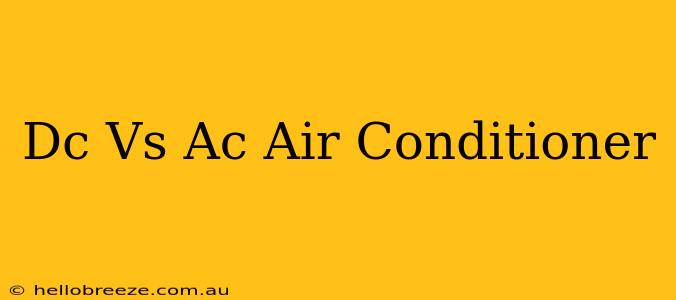Choosing the right air conditioner can significantly impact your comfort and energy bills. Two main types dominate the market: DC air conditioners and AC air conditioners. While both cool your home, they operate differently and offer distinct advantages and disadvantages. This comprehensive guide will delve into the key differences, helping you decide which type best suits your needs.
Understanding the Fundamentals: DC vs. AC
Before diving into the specifics, let's clarify the core difference: the type of current used to power the compressor.
-
AC (Alternating Current) Air Conditioners: These are the traditional and most common type. They use alternating current, which reverses its direction periodically. AC compressors tend to be simpler in design and generally less expensive.
-
DC (Direct Current) Air Conditioners: These utilize direct current, which flows consistently in one direction. DC compressors are typically more sophisticated, incorporating inverter technology for precise speed control.
Key Differences: Performance and Efficiency
The most significant distinctions between DC and AC air conditioners lie in their energy efficiency, cooling capacity, and noise levels.
1. Energy Efficiency:
-
DC air conditioners generally boast superior energy efficiency. Their inverter technology allows the compressor to adjust its speed according to the cooling demand. This means they consume less energy when the room is close to the set temperature, resulting in lower electricity bills. They often achieve higher SEER (Seasonal Energy Efficiency Ratio) ratings.
-
AC air conditioners traditionally run at a fixed speed. They either run at full power or are completely off, leading to more energy consumption and potential temperature fluctuations.
2. Cooling Capacity and Precision:
-
DC inverters offer precise temperature control. The variable speed compressor ensures consistent cooling without the on/off cycling characteristic of AC units. This results in a more comfortable and stable environment.
-
AC units might experience temperature swings as they cycle on and off to maintain the set temperature.
3. Noise Levels:
-
DC air conditioners are often quieter. The variable speed compressor operates more smoothly, reducing the noise associated with the constant starting and stopping of a traditional AC compressor.
-
AC units, due to their on/off cycling and higher operating speeds, tend to be noisier.
4. Price:
-
DC air conditioners typically come with a higher initial purchase price due to their more advanced technology.
-
AC air conditioners are generally more affordable upfront.
Which Type is Right for You?
The best choice depends on your priorities:
-
Choose a DC air conditioner if:
- Energy efficiency is paramount. You want to minimize your electricity bills.
- Precise temperature control is crucial. You value consistent and comfortable cooling.
- Quiet operation is important. You prefer a quieter indoor environment.
- You're willing to invest more upfront for long-term savings.
-
Choose an AC air conditioner if:
- Budget is a major constraint. You're looking for the most affordable option.
- Energy efficiency isn't your top priority.
Beyond the Basics: Other Considerations
Beyond the core differences, other factors to consider include:
- Size and Capacity (BTU): Ensure the unit's BTU rating matches your room's size for optimal performance.
- Features: Look for features like smart home integration, dehumidification, and filtration options.
- Warranty: A good warranty provides peace of mind.
- Installation: Professional installation is crucial for both DC and AC units.
Conclusion: Making the Informed Choice
Selecting between a DC and AC air conditioner requires careful consideration of your needs and budget. While DC units generally offer superior energy efficiency and comfort, AC units remain a cost-effective option. By carefully weighing the pros and cons outlined above, you can make an informed decision that ensures a cool, comfortable, and energy-efficient home.

